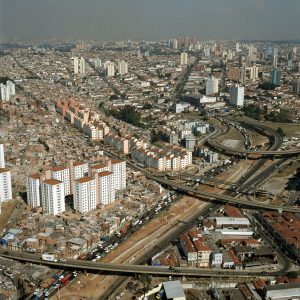4th Brazil-Japan Seminar on Cultural Environments
May 25, 2018
Co-organization:
Unit of Academic Knowledge Integration Studies of Kyoto University Research Coordination Alliance (UAKIS-KURCA) / Asia-Pacific Area Studies Project

Outline
This seminar will gather scholars from varied disciplinary backgrounds to discuss the mechanisms of formation, maintenance and decadence of centralities (political, economic, social and spatial ones) in their interlinked relationships with the spatial transformations occurring in rural and urban areas in Brazil and Japan. Among the topics to be discussed here are included: the varied definitions of centralities according to diverse disciplinary viewpoints; a reflection about how formal and informal processes of urbanization impact the relations established between centralities and the organization of rural and urban areas; and, how the emergence of new centralities induce transformation in urban and rural areas. The seminar aims at critically examining from a multidisciplinary viewpoint the potential that societies, economies and spaces in rural areas maintain to become centralities. As urban concentration has steadily increased, in parallel to an increment in environmental problems, depopulation of rural areas and other issues, it becomes urgent to discuss rather urbanization is an inevitable outcome of human evolution as a species. Understanding the factors behind the spatial patterns of accumulation of energy, knowledge, power and resources, in the functioning of centralities is fundamental to this debate.
List of Participants:
MURAKAMI Yusuke (Political Science, KU-CSEAS)
Andrea URUSHIMA (Urban Environmental Studies, KU-CSEAS)
HAMAGUCHI Nobuaki (Economic Geography, Kobe U-RIEB)
HAGIWARA Hachiro (Geography and Regional Development, Shikoku U-FMIS)
Roberta FONTAN (Urban Environmental Studies, KU-CSEAS)
SUMIDA Ikunori (Luso-Brazilian Studies, KUFS-DELB)
YAMAZAKI Keiichi (Urban Development and Housing, YNU-GSISS)
Wil de JONG (Natural Resources Management, KU-CSEAS)
List of Participating Institutions:
KU-CSEAS (Kyoto University, Center for Southeast Asia and Area Studies)
KOBE U-RIEB (Kobe University, Research Institute for Economics and Business Administration)
SHIKOKU U-FMIS (Shikoku University, Faculty of Management and Information Science)
KUFS-DELB (Kyoto University of Foreign Studies, Departamento de Estudos Luso-Brasileiros)
YNU-GSISS (Yokohama National University, Graduate School of International Social Sciences)
Program
14:00~ Greetings (MURAKAMI Yusuke, KU-CSEAS)
14:05~ Theme’s rationale (Andrea URUSHIMA, KU-CSEAS)
14:15~ Presentation 1: Spatial Economy in the Era of Shrinking Population (HAMAGUCHI Nobuaki, Kobe U-RIEB)
14:45~ Presentation 2: Spatial Distribution of Cities, Landscape Change and Traditional Agriculture in Tokushima Region (HAGIWARA Hachiro, Shikoku U-FMIS)
15:15~ Presentation 3: Rural Spaces in a Context of Intense Urbanization. The Paulista Macro Metropolis (Brazil) as a Comparative Base Study for the Kansai Region (Japan). (Roberta FONTAN, KU-CSEAS)
15:45~ Coffee Break
16:00~ Comments:
(SUMIDA Ikunori, KUFS-DELB; YAMAZAKI Keiichi, YNU-GSISS; Wil de JONG, KU-CSEAS)
17:00~ General Discussion
17:45~ Closing
Short Profile of Speakers:
Hamaguchi Nobuaki
Director and professor of Research Institute for Economics and Business Administration, Kobe University. He is also a faculty fellow and program director in regional economy program of Research Institute of Economy, Trade, and Industry. He was a Latin America specialist of Institute of Developing Economies in 1987-2003. He holds Ph.D. in Regional Science from University of Pennsylvania and BA in Luso-Brazilian Study from Osaka University of Foreign Studies. In recent years, his research has been focusing on spatial elements of economic development, encompassing industrial location, urbanization, rural economy, migration, and inequality both in Japan and international, especially Latin America.
Hagiwara Hachiro
Full-professor at Shikoku University, Faculty of Management and Information Science. Born in Tokyo, he earned a Bachelor degree from Waseda University, in the Faculty of Pedagogy, with a major in geography and history. He also earned the Master degree and completed his doctoral course at Rissho University, in Geography. During the post-graduate research, he investigated water supply and drainage systems of Mexico City and Sao Paulo, as well as, Tokyo and Paris. His specialty is urban geography and regional studies of Latin America, and in Tokushima he organizes visits to rural areas with students in cooperation with the local government.
Roberta Fontan
Architect and urbanist, with PhD in Environmental Science and master’s in Architecture and Urbanism, both at University of São Paulo (USP, financed with a scholarship from Ministry of Education CAPES Program). She has experience as a geoprocessing specialist at University of Campinas-UNICAMP, with a bachelor in architecture and urbanism from the Federal University of Pernambuco and a bachelor in Computer Science at the Catholic University of Pernambuco. She used to be, since 2009, a research assistant at the Metropolis Laboratory at the Faculty of Architecture and Urbanism at University of São Paulo (Lume/FAU/USP), and investigated about rural areas of Sao Paulo metropolitan and macro-metropolitan context. She is currently a short-term visiting assistant professor in the Center for Southeast Asian Studies at Kyoto University. Her actual research is concerned with the urban expansion and rural area transformation in Kyoto and Osaka metropolitan areas since the 1950s.
Venue:
Kyoto University, Inamori Foundation Memorial Building, 2nd floor (room 213)
Access: https://en.kyoto.cseas.kyoto-u.ac.jp/
Nearest train station: Jingu-Marutamachi St.
Languages: English, Portuguese